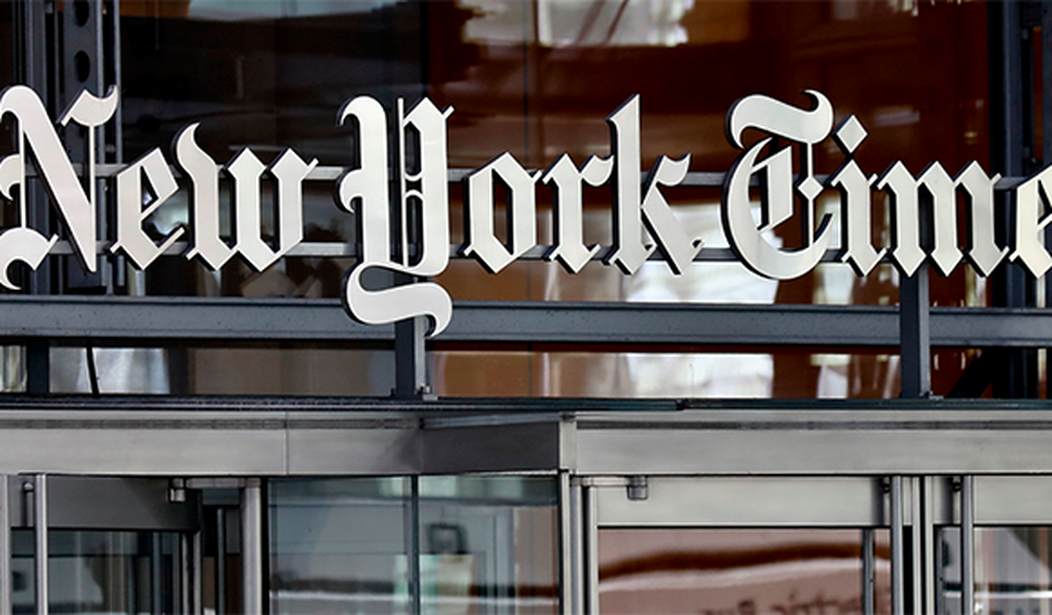On Friday, The New York Times published a David Brooks column condemning cancel culture and warning that excluding and marginalizing conservatives damages discourse on both the right and the left. His balanced column slams both sides and praises Substack, a journalism subscription outlet that helps to balance the rush to ideological conformity. Yet leftists couldn’t take it. They slammed the Times for giving space to “fragile white columnists.”
Brooks made two claims that drew the leftists’ ire. He compared “the exclusion of conservatives from academic life” to the “oldest and vastest … exclusion of people of color from the commanding institutions of our culture.” He also lamented that “Christopher Hitchens was one of the great essayists in America. He would be unemployable today because there was no set of priors he wasn’t willing to offend.”
David Brooks’ painfully balanced attack on cancel culture
Both conservatives and liberals would have found a great deal of Brooks’ column offensive, and that, perhaps, is exactly the Times writer’s point. Right after acknowledged that there is an “exclusion of conservatives from academic life,” Brooks lumped together “the Marxist left and the theological right,” noting a “marginalization of those with radical critiques.”
There are millions of theologically-minded Americans who arguably should be offended to be lumped in with the Marxist left — a faction that wants to upend essentially all of American society. However, Brooks is attempting to get those on the Marxist left to sympathize to some degree with true religious believers. Marxism is arguably far less marginalized in American society than conservative Christianity (just look at the 1619 Project), but Brooks knows his audience and leftists might be willing to think twice about conservative Christians if they (rightly) see them as a marginalized group.
Similarly, Brooks compares the impact of the marginalization of conservatives on both the right and the left.
“Conservatives were told their voices didn’t matter, and many reacted in a childish way that seemed to justify that exclusion. A corrosive spirit of resentment and victimhood spread across the American right — an intellectual inferiority complex combined with a moral superiority complex,” he argues. “For many on the right the purpose of thinking changed. Thinking was no longer for understanding. Thinking was for belonging. … Thinking was for conquest: Those liberals think they’re better than us, but we own the libs.”
Brooks even argues that “Thinking itself became suspect. Sarah Palin and Donald Trump reintroduced anti-intellectualism into the American right: a distrust of the media, expertise and facts. A president who dispenses with the pen inevitably takes up the club.”
I vehemently disagree with most of Brooks’ points here. The subversion of thought, transforming it from a pursuit of the truth to a political weapon, was pioneered on the left by Marxists, not on the right. While some corners of the right may be hostile to nuance, a conservative perspective is grounded in reason and evidence, in contrast to the stifling orthodoxy of the left. While there is a spirit of resentment and victimhood on the right, I would argue that it is well-grounded in the very trends Brooks describes.
Yet Brooks also criticizes the left.
Intellectual segregation has been bad for the left, too. It produced insularity. Progressives are often blindsided by reality — blindsided that Trump won the presidency; blindsided that Joe Biden clinched the Democratic presidential nomination. The second consequence is fragility. When you make politics the core of your religious identity, and you shield yourself from heresy, then any glimpse of that heresy is going to provoke an extreme emotional reaction. The third consequence is conformity. Writers are now expected to write as a representative of a group, in order to affirm the self-esteem of the group. Predictability is the point.
Then he addresses cancel culture. “Now the boundaries of exclusion are shifting again. What we erroneously call ‘cancel culture’ is an attempt to shift the boundaries of the sayable so it excludes not only conservatives but liberals and the heterodox as well. Hence the attacks on, say, Steven Pinker and Andrew Sullivan.”
Brooks notes that 62 percent of Americans said they are afraid to share things they believe, according to a Cato Institute poll. A majority of staunch progressives said they feel free to share their political views, but majorities of liberals, moderates, and conservatives do not. Americans are already starting to rebel against the groupthink and exclusion, however. A Politico poll found that 49 percent of Americans say cancel culture has a negative impact on society.
Brooks concludes by pointing to new initiatives on the internet like Substack that enable writers to escape the stifling orthodoxy of cancel culture. He expresses hope that “the long history of intellectual exclusion and segregation will seem disgraceful” and that “it will seem disgraceful” for a university to only have 1.5 percent conservatives on the faculty, like at Harvard.
Democrats Outnumber Republicans 70 to 1 in College Religion Departments, 10 to 1 Overall
Leftists blast NYT for “fragile white columnists”
Yet, as if on cue, leftists rushed to demonize The New York Times for daring to publish Brooks’ attempt at a balanced column.
The Nation‘s Elie Mystal tweeted, “Do not put fragile white columnists on blast, do real work instead. Do not put fragile white columnists on blast, do real work instead. Our Father, Who art in Heaven, hallowed be Thy name. Do not put fragile white columnists on blast, do real work instead.” She then admitted that she had not even read Brooks’ column because she “KNEW it would just make me angry.” So… who’s fragile, again?
Do not put fragile white columnists on blast, do real work instead.
Do not put fragile white columnists on blast, do real work instead.
Our Father, Who art in Heaven, hallowed be Thy name.
Do not put fragile white columnists on blast, do real work instead.— Elie Mystal (@ElieNYC) July 24, 2020
Zimbabwean American writer Zoe Samudzi, a writer published at The Daily Beast and Vice, tweeted that Brooks’ column “makes it very obvious he knows not what he is talking about. You want to find conservatives in academia, walk into any given political science department.”
According to a study from the National Association of Scholars, there are 8.2 Democrats for every one Republican in American political science departments.
In which David Brooks makes it clearly obvious he knows not what he is talking about. You want to find conservatives in academia, walk into any given political science department lol https://t.co/Rtfql4nEM5
— Zoé (@ztsamudzi) July 24, 2020
Shannon Watts, founder of the anti-gun group Moms Demand Action, criticized the Times for publishing a supposedly racially-biased column.
“If there were more Black and Latina women writing editorials for the New York Times, this oped might have been about how a white Congressman called a Latina colleague a ‘f***ing b**ch’ with impunity. Instead, we’re debating whether white men like David Brooks have enough freedom,” Watts tweeted.
If there were more Black and Latina women writing editorials for the New York Times, this oped might have been about how a white Congressman called a Latina colleague a "fucking bitch" with impunity. Instead, we’re debating whether white men like David Brooks have enough freedom. https://t.co/ddp7r1hhmE
— Shannon Watts (@shannonrwatts) July 24, 2020
This Activist’s Marxist Brainwashing Explains Why Antifa Has Terrorized Portland for 51 Nights
David Rothkopf, a professor of international relations and CEO of the Rothkopf Group, defended the exclusion of conservatives from academia by condemning conservative views as racist and anti-science.
“Some of the most prominent conservatives denied access to academic podiums have promoted racism or denied science or rejected rigor. When you violate academic standards you are not promoting an ‘alternative view.’ You are disqualifying yourself,” he claimed. He went on to slam the “right wing information ecosystem” as a dangerous “purveyor of hate and contempt for science, free speech, tolerance and our true values of openness as we’ve ever seen.”
We have a right wing president, a right wing senate, more right wing media than ever, a right wing information ecosystem that is–objectively–as dangerous a purveyor of hate and contempt for science, free speech, tolerance and our true values of openness as we've ever seen.
— David Rothkopf (@djrothkopf) July 24, 2020
This demonizing of conservative views is exactly the problem. While a few right-wing provocateurs like Milo Yiannopoulos caused a great deal of controversy, academics like Charles Murray have been falsely accused of racism and silenced by angry mobs. The “anti-science” label is often used to silence conservative Christians who doubt the theory of evolution and to silence skeptics who question climate alarmism (which has predicted disaster after disaster, with each prediction failing to come true).
In fact, pseudo-conservatives like David Brooks are partially to blame for the demonization of conservative views. He has dismissed well-founded criticism of climate alarmism, abortion, and gun control — and claimed that former President Barack Obama’s presidency was “remarkably scandal-free.”
If even David Brooks cannot criticize the terrifying orthodoxy of the left’s cancel culture (complete with attacks on conservatism as anti-intellectual) without having leftists brand the Times a defender of racism, what kind of woke inquisition will satisfy the Twitter mob which Bari Weiss claimed is the “ultimate editor” of The New York Times?
Tyler O’Neil is the author of Making Hate Pay: The Corruption of the Southern Poverty Law Center. Follow him on Twitter at @Tyler2ONeil.









Join the conversation as a VIP Member